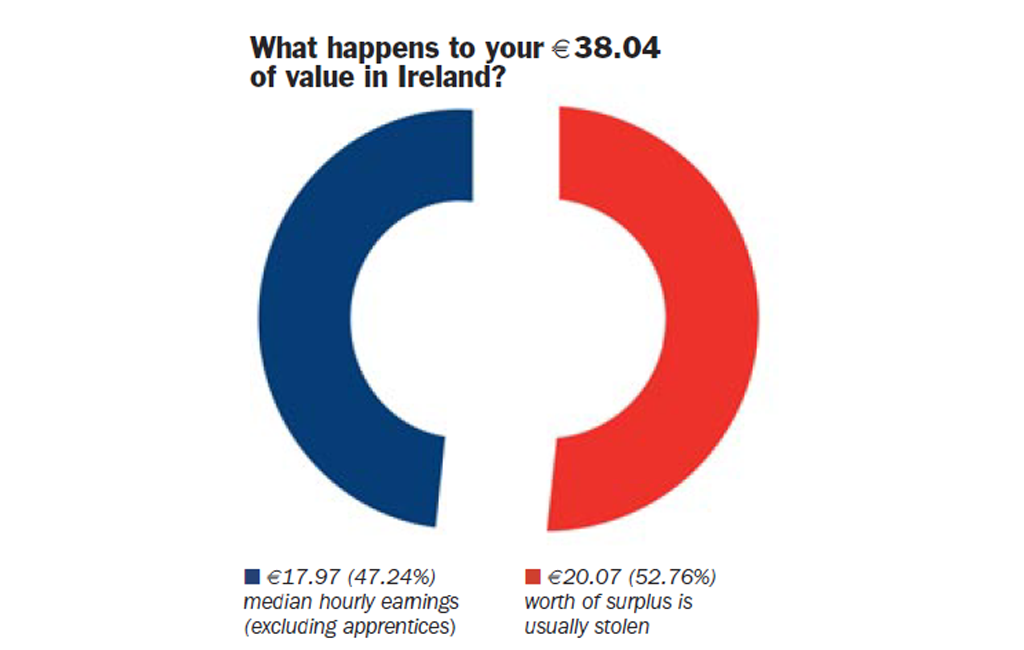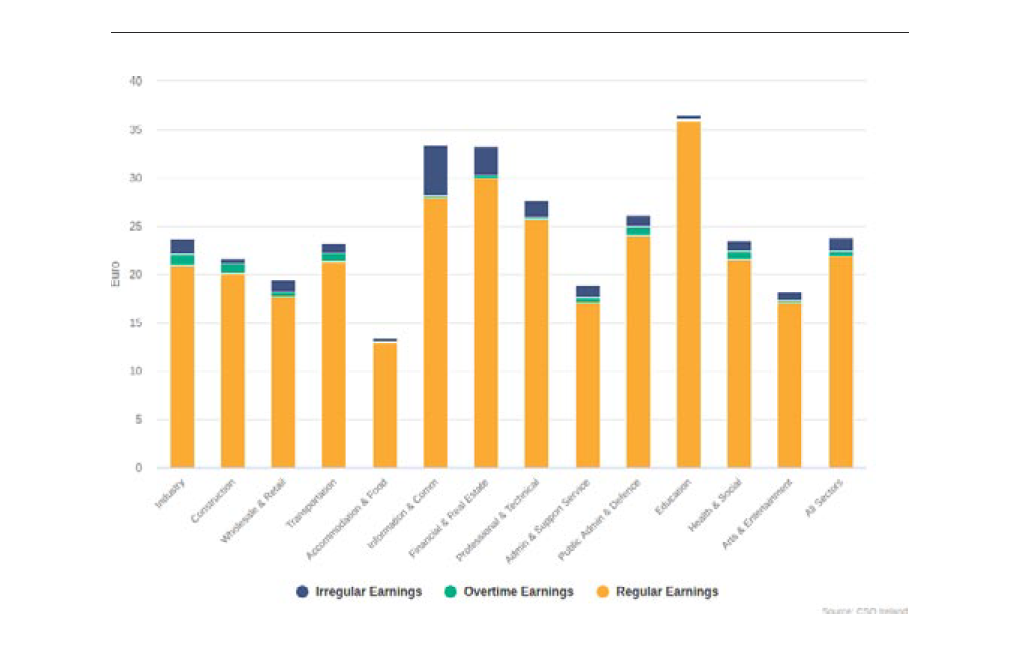The upper limit of a transformative wage demand
A transformative strategy is “a means by which to expose the antagonistic contradictions between capitalism and the working class and, in so doing, to undermine capitalism and present the potential for a socialist alternative.”¹
While an increase in the minimum wage from €10.20 to a “living wage” of €12.30² would undoubtedly improve the lives of many, and should be supported, it poses no threat to the reproduction of capitalist social relations. So, what would count as a transformative wage demand?
To understand this we need to determine the average amount of value produced by a worker each hour. We can then approximate the hourly wage that, under present conditions, would make capitalist production relations impossible, given that workers would be remunerated for the full value of their labour.
That breaking-point for capital is the €38.04 worth of value created each hour in 2018 by the 189.3 million workers in the EU-27, as seen in table 1. This means that the median (a better assessment of the “average” than the mean) Irish worker is paid €34,754 to produce €73,569 worth of value each year. In other words, a surplus of somewhere around €38,815 per worker is usually being produced over and above what is being paid.
This is what Marxists mean when the matter of exploitation is discussed. It is not a subjective feeling of being treated badly by one’s boss: it is the concrete figure of €38,815 that represents a surplus of labour that was not paid for under capitalist production relations.
Table 1: EU-27 aggregate data, 2018³
| Net national income | €13,929,602,801,250 |
| Employed work force | 189,298,000 |
| Net national income per worker | €73,586 |
| Average hours worked per week | 40.3 |
| Weeks worked per year | 48 |
| Total hours worked per year | 1,934 |
| Average value created per hour per worker | €38.04 |

Sources: OECD, Eurostat, CSO.
During simpler times, this type of exploitation was easier to see. A peasant farmer would plant a field in the spring, tend to it in the summer, then harvest and store the grain in the autumn. At the end of the harvest the church might take a quarter of the total grain produced, the landlord would take another quarter, and the poor peasant would be left staring at half of what they harvested, praying that it would sustain their family until the next year.
Thanks to the opacity of wage labour today, we’re not even given the dignity of seeing the surplus we create being taken from us. Yet the surplus is created, and the Irish worker is left with a little under half of what they produce each year.

Detractors will cry that it is “unrealistic and unreasonable” to demand €38.04 an hour. But we must remember that all progress depends on the unreasonable person. The detractor would be quite right: it does seem quite unreasonable—as it should be. We are demanding what is impossible to concede under capitalist production relations, thereby showing its limits.
Furthermore, we should not be seeking to adapt ourselves to the point of being seen as reasonable or legitimate within the confines of an ideology that, quite unreasonably, legitimises the theft of more than half a person’s work each year to further enrich an obscenely wealthy minority
Let us leave that politics of respectability to our moderate friends, who may be fond of red flags but not the politics they symbolise. Our goal is to demonstrate this obscenity and show that there is an alternative. How unreasonable this idea is in society simply shows how much ground we have yet to cover.
After all, there is nothing unreasonable about expecting to be remunerated for the full value of your labour, and there is no sector in Ireland in which the average employee would not benefit from a socialist economy that achieves this. It is also no surprise that the sector in which the average wage is closest to reaching €38.04 an hour, education, is also one of the most highly unionised.
None of us are passive spectators in our future. With mounting debt and unemployment we cannot afford to give a subsidy of almost €95 billion each year to a parasitic class that lives off our labour. Only a socialist economy and a unionised and organised working class can help us plan our work in a way that allows us to tackle the many crises we are facing while ending this type of obscene exploitation.
Ireland is not a poor country incapable of providing ample housing, medical services and education for its citizens—despite what we are told by the establishment. The idea that we cannot provide these services is simply a lie. It is in our interests, both collective and individual, to build an economy that is democratic, capable of planning to meet the basic needs of our citizens, and willing to remunerate each for the full extent of our labour.
These are not just reasonable demands: they are increasingly urgent to realise for our collective future.
References
- CPI, “Developing and building a coherent strategy for socialism” (2017) (https://www.communistpartyofireland.ie/c-2017-02-13.html).
- James Ward, “Government to examine introduction of living wage, Taoiseach says,” Irish Examiner, 27 December 2020 (https://www.irishexaminer.com/news/arid-40197090.html).
- From Paul Cockshott, “Who benefits from socialism?” (https://www.youtube.com/watch?v=zfHV0y). When European figures are used as a proxy to estimate the value produced by an Irish worker over the course of a year, as a comparable calculation, using Irish national income statistics, gives a figure close to €67 per hour. This is a figure that is distorted considerably by our status as a tax haven, even when using adjusted measures such as gross national income.






